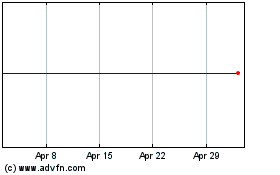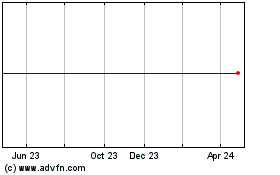Google CEO Sundar Pichai to Meet With Top GOP Lawmakers
September 24 2018 - 7:28PM
Dow Jones News
By John D. McKinnon and Douglas MacMillan
WASHINGTON -- Google Chief Executive Sundar Pichai plans to
appear at a private meeting of top GOP lawmakers on Friday and
again at a public hearing this year, responding to new scrutiny of
the company's work with China, its market power and alleged bias
against conservatives in its search results.
The move comes amid growing regulatory concerns for the Alphabet
Inc. unit and other big internet services such as Facebook Inc. and
Twitter Inc., as bipartisan worries grow about the companies' size
and influence, as well as the potential for abuses.
"Google has a lot of questions to answer about reports of bias
in its search results, violations of user privacy, anticompetitive
behavior and business dealings with repressive regimes like China,"
said House Majority Leader Kevin McCarthy (R., Calif.), who is
organizing Friday's meeting. He added that Mr. Pichai has "kindly"
agreed to field Congress's questions with Republican members on
Friday. Mr. Pichai also is expected to appear at a House Judiciary
Committee hearing after the November election.
Mr. McCarthy has complained that Google works with China to
censor the internet but has canceled a contract with the U.S.
military. Google this year said it wouldn't renew a contract with
the U.S. Department of Defense over employee concerns about aiding
military projects; the company has also tested a mobile version of
its search engine that would adhere to China's strict controls over
content, a person familiar with the matter said.
The tech industry began facing serious political challenges last
year, amid revelations of Russian meddling in the 2016 election,
but Google initially escaped some of the intense scrutiny that
Facebook and Twitter have endured. Since then, however, the company
has drawn fire over privacy on its Gmail service and allegations by
conservatives that its search results stifle their viewpoints.
Lawmakers have also expressed frustration with Google for not
sending a top-level executive to a recent hearing.
"I look forward to meeting with members on both sides of the
aisle, answering a wide range of questions, and explaining our
approach. These meetings will continue Google's long history of
engaging with Congress, including testifying seven times to
Congress this year," Mr. Pichai said.
Mr. McCarthy, who is aiming to help preserve the GOP's House
majority and improve his chances of becoming speaker, has emerged
as a vocal critic of the tech companies in recent months, as
conservative voters appear to be focusing more on the issue of
alleged political bias. He has been joined by President Trump, who
recently accused Google of manipulating search results to highlight
negative news reports about him.
Tech firms deny that they skew their news feeds, search or other
functions to boost liberals or hurt conservatives.
Democrats including Sens. Mark Warner of Virginia and Elizabeth
Warren of Massachusetts have also criticized Google on China and
other issues.
Additional meetings planned for Washington this week could
provide a glimpse of what steps policy makers and regulators could
take to rein in the tech giants.
On Tuesday, U.S. Attorney General Jeff Sessions is expected to
meet with state attorneys general to discuss alleged stifling of
conservative speech online, as well as possible antitrust concerns
over Google as well as Facebook and others. On Wednesday, the
Senate Commerce Committee holds a hearing focused on internet
privacy concerns, amid growing bipartisan calls for legislation to
govern online data collection and use.
Tech firms also are facing a new documentary by a prominent
conservative author, Peter Schweizer. The film, entitled "The
Creepy Line," raises allegations that tech firms hold too much
power and suppress conservative views.
Conservatives' current focus on big tech clearly has a potential
political upside. A majority of Republicans -- 64% -- say major
tech companies support the views of liberals over conservatives,
according to a recent Pew Research Center poll.
Allegations of anticonservative bias also could help divert
attention from Russian meddling in the 2016 election that appeared
to use tech platforms such as Facebook to manipulate public opinion
and support Mr. Trump.
But the current antitech atmosphere goes beyond political
maneuvering. As concerns grow among lawmakers and regulators, the
debate appears to be expanding from politics to policy, and
prospects for new regulation are increasing, no matter who wins the
midterm election and control of the House and Senate.
That reality came home in a letter that a bipartisan group of
senators wrote last week to the Trump administration, urging
legislation to impose a new "enforceable nationwide standard" for
collection and use of online data. The letter was written by the
top Republicans and Democrats on two Senate Commerce subcommittees,
Sens. Jerry Moran (R., Kan.), Roger Wicker (R., Miss.), Richard
Blumenthal (D., Conn.) and Brian Schatz (D., Hawaii).The
administration also could release its own set of principles for
online privacy this week. They could further fuel talk of broad
online privacy legislation -- something the tech companies have
successfully avoided for years.
Write to John D. McKinnon at john.mckinnon@wsj.com and Douglas
MacMillan at douglas.macmillan@wsj.com
(END) Dow Jones Newswires
September 24, 2018 19:13 ET (23:13 GMT)
Copyright (c) 2018 Dow Jones & Company, Inc.
Twitter (NYSE:TWTR)
Historical Stock Chart
From Mar 2024 to Apr 2024

Twitter (NYSE:TWTR)
Historical Stock Chart
From Apr 2023 to Apr 2024
